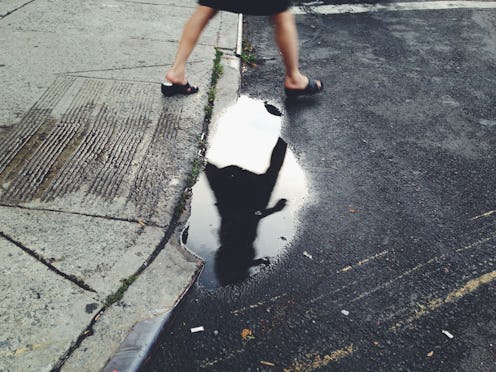Life
“Walking Depression” Is Just Like Major Depression — Only Harder To Spot From The Outside

Oftentimes when people disclose their mental illness or illnesses, their admissions are met with genuine surprise: "I had no idea; you seem so together!" But as many people who live with mental illness know, mental health issues can take many forms. Not everyone with depression exhibits typical symptoms; in fact, people with walking depression or smiling depression may seem like they don't have any struggle at all, but do.
According to Healthline, "Smiling depression is a term for someone living with depression on the inside while appearing perfectly happy or content on the outside. Their public life is usually one that’s 'put together,' maybe even what some would call normal or perfect." Because people with walking depression seem fine — perhaps even privileged — to the outside eye, it can be difficult for those living with this type of mental illness to disclose their struggle. What's more, people with walking or smiling depression may overcompensate for how they feel on the inside by appearing extremely together on the outside.
A persistent myth about depression is that people who have everything together shouldn't be depressed or anxious, and this kind of thinking is a barrier to treatment. The truth is that mental illness doesn't discriminate. It can happen to anyone, and while money can buy better care, it can't cure mental illness.
"Someone experiencing smiling depression would — from the outside — appear happy or content to others. On the inside however, they would be experiencing the distressful symptoms of depression," Healthline reported. As more and more people who seem to be living their best lives go public about their private struggles with mental illness, it's an opportunity to start a dialogue about the common misconceptions about anxiety and depression.
You also might find it surprising that some people with smiling depression aren't even aware that they have it, making knowledge of its existence even more important. While walking or smiling depression isn't an official diagnosis, it may also be referred to as "high-functioning depression," and it can be difficult to detect if you're not the person living it.
"Smiling depression often goes undetected. Those suffering often discount their own feelings and brush them aside. They might not even be aware of their depression, or want to acknowledge their symptoms due to a fear of being considered weak," Rita Labeaune, Psy.D. explained on Psychology Today. Labeaune explained that symptoms of walking or smiling depression are the same as those for depression, meaning sadness, fear, anxiety, loss of appetite, fatigue, trouble sleeping, and more. Walking depression, however, typically doesn't interfere with one's day-to-day responsibilities in the same way major depression can, according to Project Helping.
One way you can educate yourself about mental illness is by taking a mental health first-aid class from Mental Health First Aid USA. The course is free, and you can find one near you on their website. Being educated about the signs and symptoms of mental illness can not only help you help others, it can also help you understand them in yourself. Born This Way President and Co-Founder (and Lady Gaga's mom) Cynthia Germanotta told Bustle earlier this year that she took the course and walked away armed with information she wished she'd had sooner.
"It helped me understand the difference between normal variations in mood and behavior, and signs that someone might be experiencing a mental health issue. As a mom, I wish I had that knowledge sooner. When my children were younger, I didn’t always know the difference between typical adolescent development and signs that they were struggling. Mental health first aid would have been so helpful."
If you're struggling with any kind of depression, you deserve help, and it's OK to ask for it. What you're experiencing is real. It's valid, and you don't have to go through it alone.
If you or someone you know is experiencing suicidal thoughts, call the National Suicide Prevention Hotline at 1-800-273-8255 or text HOME to the Crisis Text Line at 741741. You can also reach out to the Trans Lifeline at 877-565-8860 or the Trevor Lifeline at 1-866-488-7386, or to your local suicide crisis center.